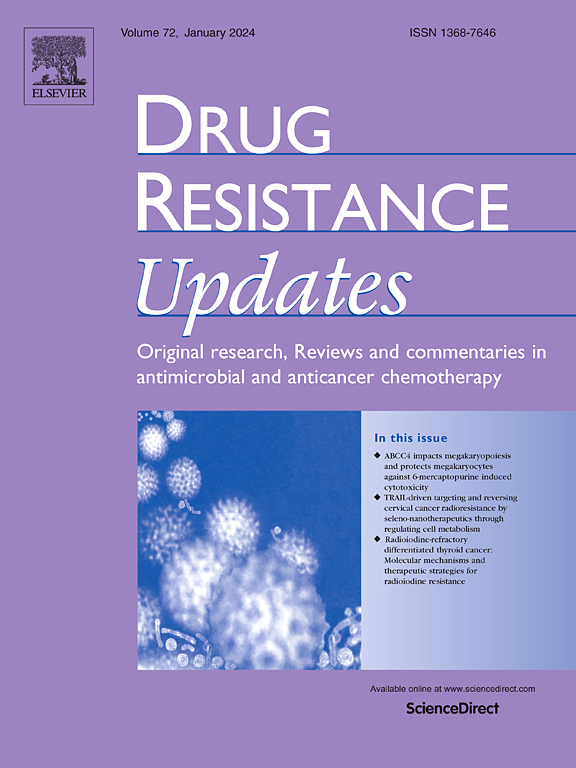Hypoxia-induced upregulation of HIF1A-AS3 promotes MSC transition to cancer-associated fibroblasts and confers drug resistance in gastric cancer
IF 21.7
1区 医学
Q1 PHARMACOLOGY & PHARMACY
引用次数: 0
Abstract
Chemotherapy resistance is a major cause of poor prognosis in gastric cancer patients and tumor microenvironment plays a critical role in conferring chemotherapy resistance. As a dominant source of tumor stromal cells, mesenchymal stem cells (MSCs) exert pro-oncogenic activities when reprogrammed to a cancer-associated fibroblast (CAF) phenotype. The precise mechanisms for MSC reprogramming and their subsequent role in chemotherapy resistance have not been fully understood. Herein, we reported that HIF1A-AS3, a lncRNA that was highly expressed in tumor-promoting MSCs, was upregulated in tumor tissues and serum of gastric cancer patients and associated with poor prognosis. The upregulation of HIF1A-AS3 reprogramed MSCs to acquire the CAF phenotype, which consequently enhanced the resistance of gastric cancer cells to oxaliplatin. Mechanistically, hypoxia related transcription factor HIF-1α induced high expression of HIF1A-AS3 in MSCs. Then, HIF1A-AS3 competitively sponged miR-142–3p and miR-24–3p, leading to the upregulation of PROX1 (prospero-related homeobox protein 1) gene expression. This further promoted the nuclear translocation of β-catenin and the activation of β-catenin signaling pathway in MSCs, which critically regulated their transition to CAFs. Finally, targeted inhibition of HIF1A-AS3 in hypoxia-MSCs through exosome-mediated siRNA delivery significantly suppressed gastric cancer growth and improved chemosensitivity in mouse tumor models. Conclusively, hypoxia-induced HIF1A-AS3 upregulation reprograms MSCs to CAFs through the miR-142–3p/miR-24–3p/PROX1/β-catenin axis, thereby promoting chemotherapy resistance in gastric cancer, which uncovers a new molecular mechanism for MSCs transition to CAFs in gastric cancer and provides a new target for the diagnosis and targeted therapy of gastric cancer.
缺氧诱导的HIF1A-AS3上调可促进间充质干细胞向癌症相关成纤维细胞转化,并在胃癌中产生耐药性
化疗耐药是胃癌患者预后不良的主要原因,肿瘤微环境在化疗耐药的形成中起着至关重要的作用。作为肿瘤基质细胞的主要来源,间充质干细胞(MSCs)在重编程为癌症相关成纤维细胞(CAF)表型时发挥促癌活性。MSC重编程的确切机制及其在化疗耐药中的后续作用尚未完全了解。本文中,我们报道了在促肿瘤MSCs中高表达的lncRNA HIF1A-AS3在胃癌患者的肿瘤组织和血清中表达上调,并与不良预后相关。HIF1A-AS3的上调使MSCs重编程获得CAF表型,从而增强胃癌细胞对奥沙利铂的抗性。机制上,缺氧相关转录因子HIF-1α诱导MSCs中高表达HIF1A-AS3。然后,HIF1A-AS3竞争性地海绵化miR-142-3p和miR-24-3p,导致PROX1 (prospero-related homobox protein 1)基因表达上调。这进一步促进了β-catenin的核易位和β-catenin信号通路的激活,这对MSCs向CAFs的转变起着关键的调节作用。最后,在小鼠肿瘤模型中,通过外泌体介导的siRNA递送靶向抑制HIF1A-AS3在缺氧间充质干细胞中显著抑制胃癌生长并改善化疗敏感性。总之,缺氧诱导的HIF1A-AS3上调通过miR-142-3p/miR-24-3p/PROX1/β-catenin轴将MSCs重编程为CAFs,从而促进胃癌的化疗耐药,揭示了胃癌中MSCs向CAFs转变的新的分子机制,为胃癌的诊断和靶向治疗提供了新的靶点。
本文章由计算机程序翻译,如有差异,请以英文原文为准。
求助全文
约1分钟内获得全文
求助全文
来源期刊

Drug Resistance Updates
医学-药学
CiteScore
26.20
自引率
11.90%
发文量
32
审稿时长
29 days
期刊介绍:
Drug Resistance Updates serves as a platform for publishing original research, commentary, and expert reviews on significant advancements in drug resistance related to infectious diseases and cancer. It encompasses diverse disciplines such as molecular biology, biochemistry, cell biology, pharmacology, microbiology, preclinical therapeutics, oncology, and clinical medicine. The journal addresses both basic research and clinical aspects of drug resistance, providing insights into novel drugs and strategies to overcome resistance. Original research articles are welcomed, and review articles are authored by leaders in the field by invitation.
Articles are written by leaders in the field, in response to an invitation from the Editors, and are peer-reviewed prior to publication. Articles are clear, readable, and up-to-date, suitable for a multidisciplinary readership and include schematic diagrams and other illustrations conveying the major points of the article. The goal is to highlight recent areas of growth and put them in perspective.
*Expert reviews in clinical and basic drug resistance research in oncology and infectious disease
*Describes emerging technologies and therapies, particularly those that overcome drug resistance
*Emphasises common themes in microbial and cancer research
 求助内容:
求助内容: 应助结果提醒方式:
应助结果提醒方式:


